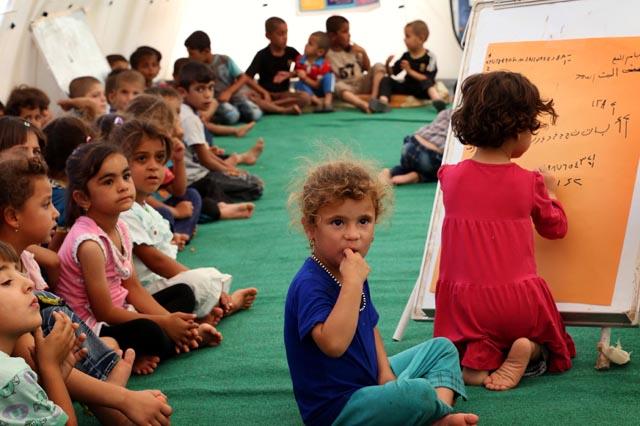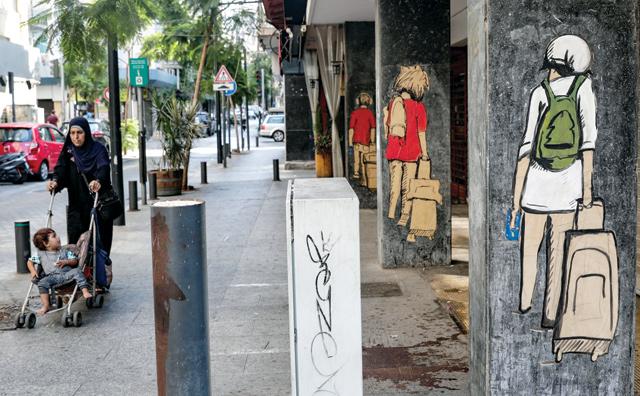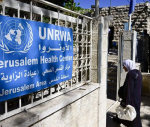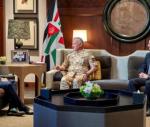You are here
Children face ‘education emergency’ in north Iraq
By AFP - Sep 04,2014 - Last updated at Sep 04,2014

AINKAWA, Iraq — Hundreds of thousands of children in Iraq's northern Kurdish region are facing an "education emergency" after being forced from their homes, with hundreds of schools used to shelter displaced families.
The Kurdish regional government says schools will open as planned next Wednesday but, on top of the huge challenge of educating those who have been displaced, there are major concerns about where those now living in schools will be moved.
"It is a major disaster for children," said Brenda Haiplik, an education expert from the UN children's agency, UNICEF.
"Education is life-saving. After a child has been to hell and back, education gives him or her an opportunity to go forward. Without that, the future is dim."
The United Nations says up to 1.8 million Iraqis have been displaced since January, with around 850,000 seeking refuge in autonomous, three-province Kurdistan.
Swathes of Iraq have been seized by militants since the beginning of the year, especially in a major jihadist-led offensive launched in June, causing widespread displacement of people desperate to escape the unrest.
With unsanitary camps scattered across the north overflowing with Iraqis who fled their homes, thousands of families have sought refuge in schools.
In Dohuk, the worst-affected Kurdish province, more than 600 schools are now home to displaced families.
"We are facing an education emergency" that affects the displaced, the more than 200,000 Syrian refugees in the Kurdistan region and local children alike, Haiplik told AFP.
The Kurdistan region's education minister, Pishtiwan Sadiq, said that school for local residents will begin as planned everywhere except in Dohuk, where the UN says 64 per cent of the north's displaced are located.
"And as soon as housing is provided [for displaced families], we are ready to cover their educational needs," Sadiq told AFP.
'Education is everything'
But he admitted the authorities are struggling to find shelter for the displaced.
"The Kurdistan government doesn't have the infrastructure to give shelter to the displaced. And assistance from the international community is very slow," he said.
With the deadline for the start of the academic year looming, schools in the region's capital Erbil were still home to thousands of displaced people, with up to four families sharing a single classroom.
"We don't know what our future holds," said Noel Jamil, whose family of 11 shared a room with three other families at a school in Ainkawa, a suburb of Erbil.
Jamil, who works as a schoolteacher and whose family was forced to leave the town of Qaraqosh several weeks earlier, said: "If school starts, we will have to leave here and go to a camp, or somewhere else, perhaps. We don't know where we will go.”
"We also don't know when our children will get the chance to go back to class," said Jamil.
Ahlam Kamel, a 45-year-old mother of four girls living in a tent in the playground of the school, echoed Jamil's concerns.
"Education is everything to us, it is the guarantee of my children's future... I can't put into words just how much we are suffering," Kamel said, as her 12-year-old daughter Siba wept quietly.
'Tip of the iceberg'
UNICEF's Haiplik said the complexity of the humanitarian crisis, as well as funding shortfalls, make it hard to see just how the dual challenges of starting school next week and reintegrating all the displaced children into school can be met.
"I hope some schools do reopen in time, but there is a lot of work to do," Haiplik said, adding that the UN is working with the local authorities on alternatives such as schools in pre-fabricated buildings near camps.
"But there are a lot of protection issues involved... It takes a lot of coordination and the funding needs are massive," she said.
Similar issues affect children in central and southern Iraq, said Haiplik, and ongoing fighting across the country means that an unknown number of children are stuck in more violent areas that are impossible to reach.
"It just breaks our hearts," said Haiplik. "We are aware that the crisis in Dohuk and other areas... is just the tip of the iceberg. It's a horrific situation."
Related Articles
BEIRUT — Students in Lebanon will return to the classroom starting next month, the education minister said on Monday, amid fears an accelera
AMMAN — The Ministry of Education and the British Council on Wednesday signed the amended addendum to their joint agreement to implement the
AMMAN — Minister of Education Tayseer Nueimi on Thursday participated in a virtual conference organised by the Islamic World Organisation fo
















